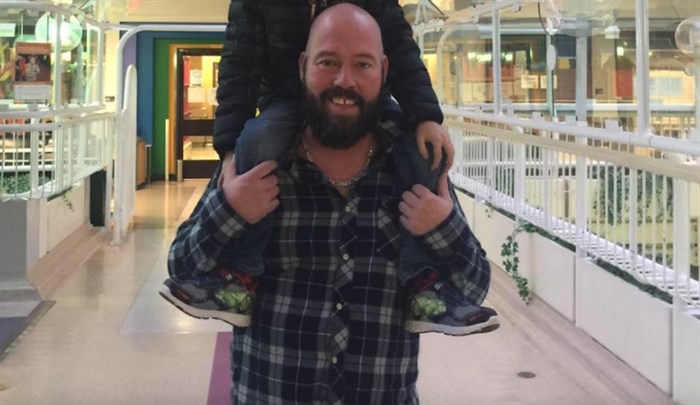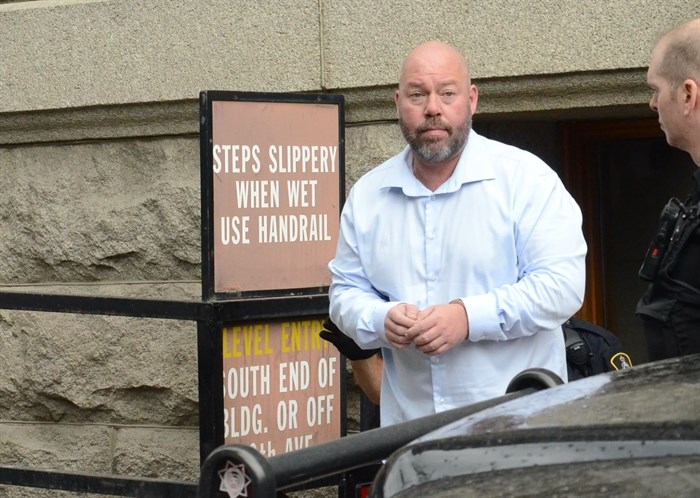
Shaun Wiebe circa 2009.
Image Credit: SUBMITTED
August 12, 2024 - 7:26 AM
On Christmas Eve 2011, more than a decade before Vernon pharmacist Shaun Wiebe was sent to jail for killing his girlfriend Heather Barker, he pinned his ex-wife, Terri Wiebe, to their bed and grabbed her throat.
"He was choking me and he stopped and I managed to get my breath and I managed to say to him, 'You need to stop or you're going to kill me,'" Terri told iNFOnews.ca.
Those words have been playing in her head since hearing that Barker said almost exactly the same thing to him.
"Stop it, you’re going to end up killing me," were Barker's last words before she stopped breathing several hours later.
For Terri, hearing those words while sitting in the public gallery at the Vernon courthouse during Wiebe's sentencing brought back painful memories.
"The coincidences of what was going on (is) parallel," she said. "I knew that it was going to happen to me or one of my children."
The 52-year-old endured years of abuse from Wiebe before she finally left him for good in 2016.
"Being belittled and verbally abused and then physically abused, mentally abused, sexually abused, it all happened," she said.
Terri changed her last name from Wiebe, and iNFOnews.ca has purposely chosen not to use her new last name.
She was Wiebe’s second wife and isn't the only woman Wiebe was violent with. The former pharmacist has a history of assaulting his partners.
Wiebe's name first became known in 2018 when his girlfriend, Heather Barker, was found dead at the couple's home in the upmarket Vernon neighbourhood The Rise. On a street where a million dollars doesn't come close to buying you a house, this sort of thing wasn't supposed to happen in a place like that.
The 46-year-old Wiebe was clearly a suspect but wasn't charged until three years later after police pulled off an elaborate undercover sting operation.
Details of what exactly took place aren't known but following Barker's death, Wiebe shut down his pharmacy and fled back to his parent's farm in Herbert, Saskatchewan.
There he was befriended by an undercover RCMP officer and eventually, after the pair had hung out drinking dozens of times, admitted he'd grabbed Barker by the hair and hit her head on the floor.
Narcotics were missing from the pharmacy safe and he'd accused Barker of taking them. The couple had got into an argument and he’d jumped on top of her, he told police.
“Did I slap her head repeatedly into the ground after I grabbed her off the bed. Yes," he told the undercover officer.
Terri says there a bitter irony that her ex-husband was caught this way - he hated cops.
While the police now finally had their suspect charged, Wiebe's drunken confession had its limitations.
During Wiebe's sentencing in June 2023, BC Supreme Court Justice Alison Beames said that if he had not pleaded guilty there would have been a complex and lengthy trial with an uncertain outcome and police's actions during the undercover operation would have faced stringent legal scrutiny.
"There certainly was a risk that Mr. Wiebe’s confessions as to his involvement in the death of Ms. Barker would not have been admissible at trial," Justice Beames said.
The outcome led to Wiebe agreeing to plead guilty to manslaughter and got the minimum four years in jail, minus six months for the time he'd already spent in custody.
As the range for manslaughter is from 15 to four years, Wiebe's sentence angered many in the community.
"(He) killed someone... and this is the consequence?" Terri said. "It's insane, it's unfathomable… an absolute joke.”
To add insult to injury, the parole board then released Wiebe in June after he spent a little over a year behind bars.
Archway Society for Domestic Peace co-executive director, Sherry Demetrick, said she was disheartened and frustrated by the parole board's move.
"Granting early release sends such a distressing message about accountability and the value of human life and ... the value of the lives of women," she said. "It sends a very upsetting message to offenders that they can perpetrate these kinds of crimes and be out a year later."
While it's standard in Canada to be granted parole after serving only one-third of a jail sentence, the parole board’s move to release Wiebe does seem odd when it says in its own decision that he is at a high risk for intimate partner violence.
"It's unfathomable," Demetrick said. "I can't wrap my head around it."

Shaun Ross Wiebe.
Image Credit: FACEBOOK/ Shaun Wiebe
Terri is also baffled by the decision.
"It's still affecting my life and my family and I left him in 2016, so what (Barker's) family is going through with this, I can't even fathom how they must be feeling," Terri said.
Barker left behind three daughters, now ranging in age from their late teens to their early twenties.
During last year's sentencing all three stood and read powerful victim impact statements to the court.
“How was it fair that at 16 years old I had to lay next to my mom in a hospital bed, her body covered in bruises from head to toe," Barker’s eldest daughter told the court. "I couldn't even say goodbye or tell her how much I loved her because she was brain dead.
"You, Shaun, took her away from us, and left a gaping hole in my life.”
There was barely a dry eye in the packed courtroom. One courtroom staffer, who through their job becomes immune to what they hear - said they had to fight back tears.
Sat in the courtroom, Terri’s adult son simply said: "Thank God, mom, that he didn't kill you. Thank God you got away."
But getting away from Wiebe wasn't an easy feat.
Wiebe had been married before when Terri met him in 2005. There had been domestic violence in his first marriage but a charge for assaulting his first wife wasn't approved.
Wiebe and Terri got married in 2008 and bought a house together in Lake Country.
"He objectifies women, they are an object to him," she said. "It's about ownership, he had to know every single second of every day, where I was, who I talked to, I essentially went from having a life outside of him to living in a bubble that he controlled."
Terri said Wiebe was a partier and a weekend drinker but became an alcoholic.
"It exacerbated his behaviour even more," she said. "That's when things really started spiralling… he was drinking constantly."
In 2010 they had a son together, but the abuse continued.
Two years later an incident happened that she couldn't ignore.
"I was holding my son and he was physically assaulting me, and I was screaming at him, telling him to stop and it was like our son didn't exist, he didn't even acknowledge that he was there," she said.
At this point, she went to the police and Wiebe was charged with assault.
A common question often asked is why victims of domestic violence don't just leave. Terri says she'd been asked many times.
Demetrick says the question is a form of victim blaming.
"That's not the question we should be asking... the question should be: Why do men abuse and murder their partners?" Demetrick said. "We really need to ask the question of why men behave this way towards their partners."
Historical trauma and a lack of coping mechanisms are two of the many factors behind why men can be violent.
"Studies show programs aren't effective, so the focus is on children and vulnerable people trying to break that cycle of violence," Demetrick said. "Our goal is to prevent those boys who might be living in the environment from becoming abusers themselves."

Archway Society for Domestic Peace co-executive Sherry Demetrick says the parole board's move to release Shaun Wiebe is disheartening.
Image Credit: Archway Society for Domestic Peace
Terri takes the question of 'why didn't you leave" gracefully.
"So many times people have said to me why didn't you go and stay at the women's shelter, why didn't you leave him sooner. Well because it was that bad. You can't just do that when you're with someone like him," she said. "It's not that simple... you don't just walk away, they don't let you do that, it's got to be under their control, their scenario.
"When I left him and finally managed to get away from him, it was a very intricate plan that involved many people," she said.
Terri’s story is long and complex, and she speaks it openly and honestly. After so many years of abuse, it's hard for her to put a timeline to the things that went on.
But during her time with Wiebe she did on many occasions try to play down the abuse with the authorities.
She once told a counsellor what was going on, who then referred the file to child services. They then said she and her son weren't safe and needed to leave.
"I said listen, I get it, (but) do you understand if I do, that I will deal with the consequences," she said. "I said, I have a plan, I'm leaving him, please just leave us alone."
At another point, she tried to talk the RCMP out of charging Wiebe, knowing that if he was convicted he'd likely lose his pharmacy licence, and they would lose their home.
After Barker's death, the RCMP approached Terri wanting her support to retroactively charge Wiebe for historical violence against her. She says she couldn't face going through with it.
But she did finally get the courage to leave and a restraining order was granted keeping him away.
However, a year later they got back together and two years later she was living with him.
"I honestly at the time felt I had no choice but to go back to him. It was one of the worst decisions I made because I did go back and I realized weeks in that I had made a very bad decision."
Terri says what is missing from the story in her case is how charming Wiebe is. She crassly says he could "talk the panties off a nun."
"He is extremely smart (and) very manipulative."
Terri’s reasons not to leave fit a pattern that the Archway Society say is common.
"(Abusers have) very methodical process to get these woman to a place of vulnerability and insecurity and dependence that makes it... more difficult to leave," Demetrick said. "The gaslighting that goes on that demoralizes these women... makes them feel like they are not smart strong independent capable women that they can be."
Also, Demetrick points out, the danger increases exponentially when women leave.
A recent case in Lumby highlights this.
Tatjana Stefanski had long ago moved past her ex-husband, but years later, Vitali Steffan is charged with her second-degree murder.
The Stefanski case caused outrage across the community after Steffan was released after being questioned by police. He then promptly tried to return to Stefanski's home where her children lived. He was finally charged six weeks later.
The small North Okanagan community of about 2,000 was shocked and frightened by the case, thinking that things like that didn't happen around there.
However, the statistics paint a far different picture - domestic violence is rife in society.
A quick and unscientific look at the court list for this upcoming week across Kamloops and the Okanagan shows that 121 individuals will have court appearances relating to intimate partner violence. The cases range from charges of mischief involving a partner to murder.
In Salmon Arm alone, 20% of those due to appear in front of a judge this week will do so because of some form of intimate partner violence.
Between April 2023 and March 2024, the Archway Society helped more than 1,500 women impacted by domestic violence and more than 250 children.

Heather Barker appears in this undated Facebook photo.
Image Credit: FACEBOOK
So why is society so blind to what is going on?
"I think that we still may be grappling with the old thought patterns where it was a family private kind of thing, that you didn't want to get involved, 'oh the neighbours are at it again,' without recognizing the seriousness or the severity of it, feeling like it wasn't your place to get involved," Demetrick said.
Another stereotype is that domestic violence is committed by ne'er-do-wells and deadbeats who are violent to everyone.
This simply isn’t true.
"Domestic violence really does transcend any socioeconomic categories, ... there is no stereotypical abuser and the prevalence in our community is exponentially higher than what most people see or believe it to be," Demetrick said.
Terri says an RCMP officer once said to her: "But he's a pharmacist."
Society struggles to accept that a professional six-figure earner could do such a thing.
While Wiebe has been charged with domestic violence against at least three separate partners, he has no other criminal record for violence and nothing for assaulting a man.
Terril describes him as a narcissistic sociopath.
Even after killing Barker, he remarried and was charged with assaulting his new wife.
According to the parole board, his third wife said he urinated on her clothes, threw her small dog, and slammed her into a fridge. The charges were later stayed.
"He figures out...what... your issues are in life and promises you that he will... fill those voids," she said.
But she said he has "zero" empathy and doesn't take any responsibility for anything.
And it's hard to disagree.

Pharmacist Shaun Wiebe leaves the Vernon Courthouse in handcuffs after being sentenced to four ears jail.
(BEN BULMER / iNFOnews.ca)
The parole board decision says Wiebe doesn't accept the official version of events – even though it was part of what got him a lenient sentence.
He maintains Barker fell and hit her head. There's no mention of how that explains the bruises and broken ribs she also had.
The parole board said he "minimized and compartmentalized" his use of violence.
"You disagreed with the suggestion that you were controlling in relationships," the parole board said. "You denied that any of the assaults consisted of 'beatings' and you said each one was unique."
Wiebe is also going to fight to get his pharmacy licence back, although it's unclear whether the regulator will hand over a licence to a convicted killer.
Terri jokes that if he does get his licence back, maybe he could pay her some of the $240,000 in maintenance he owes her.
For a woman who has been through so much, she tells her story in an upbeat manner with dry humour.
Although her story is far less humorous.
Once she finally left Wiebe for good – via an elaborate plan hatched out over two years, taking the unfortunate advantage of their son being hospitalized for months in Edmonton – she went to family court.
She calls the events in family court a "complete and utter joke."
He didn't follow court orders and never produced a T4 form showing his income.
"He was ordered consistently to show his financial documents and I never even saw one," she said. "And every time I tried to do something it cost me money and he knew that.
"He knew if you kept doing this putting things off eventually I would go away and I would stop which is exactly what happened," she said.
His delay tactics worked in the civil court, and in part the delays of his criminal trial also added to why he only got a four-year jail sentence.
During sentencing, Justice Beames pointed out, that what's known as the Jordan ruling was fast approaching.
The 2016 Jordan ruling means that an accused must have a trial within 30 months of being charged.
In Wiebe's case, this left just one month before the case had to go to trial, something the Justice said "would not and could not have been met."
Justice Beames said this could have resulted in the charges being dropped and Wiebe walking out a free unconvicted man.
It's an aspect of the criminal justice system that infuriates the Archway Society.
"They have this rule in place and then a grossly understaffed court system," Demetrick said, adding it creates a "perfect storm of significant problems."
Terri says she could write a book about her experience in the family court system, but she now has a permanent restraining order against Wiebe and is no longer in a battle over visitation rights for their 14-year-old son.
Her son went through a lot, but she says he's very resilient and understands and accepts who his dad is.
For Terri, she kept quiet about everything that took place but took the courageous move to make her story public.
"You don't realize till you're out of it just how abnormal and how bad It was," she said.
She says she felt guilty that Barker died and she beat herself up thinking there was something she could have done.
But by sharing her story she hopes it might make people understand it's more prevalent than we think and isn't confined to stereotypes.
Clothes and makeup covered her bruises but what went on behind the closed doors of the wealthy middle-class suburb where they lived was violent, brutal, and horrendous.
But she did make it out.
“I don’t see myself as a victim I see myself as a survivor,” she said. “And people need to be aware of what’s going on.”
-- Archway Society in Vernon offers support and resources regarding domestic violence at www.archwaysociety.ca or by calling 250-558-3850. Those in crisis who need immediate support can call 250-542-1122, 24 hours a day, seven days a week.
To contact a reporter for this story, email Ben Bulmer or call (250) 309-5230 or email the editor. You can also submit photos, videos or news tips to the newsroom and be entered to win a monthly prize draw.
We welcome your comments and opinions on our stories but play nice. We won't censor or delete comments unless they contain off-topic statements or links, unnecessary vulgarity, false facts, spam or obviously fake profiles. If you have any concerns about what you see in comments, email the editor in the link above. SUBSCRIBE to our awesome newsletter here.
News from © iNFOnews, 2024